Innerlife STS | Integrative Assessment
Integrative Assessment of LGBTQ Clients
The Center for LGBTQ Evidence-based Applied Research (CLEAR) recently partnered with Innerlife STS to incorporate the CARS Integrative Assessment of LGBTQ Clients into the Innerlife STS System. A description of this collaboration was presented at Florida State University in Tallahassee, Florida. The scales were developed at The Gronowski Center, Palo Alto University, Palo Alto, California under the direction of the following primary investigators:
- Professor Peter Goldblum, Ph.D., MPH, Principal Investigator
- Rebecca Floyd, Ph.D.
Grounded in sexual minority stress theory, IAT uses a non-pathologizing, strength based approach to enhance the lives of LGBTQ clients.
- Systematically assesses LGB clients to determine whether aspects of sexual minority stress (SMS)are contributing to their symptom distress or blocking them from meeting their life goals.
- Integrates sexual and gender minority stress assessment within integrated assessment of general and sexual minority specific factors.
- Specific treatment approaches are being developed to address these components of SMS.
The Minority Stress Subscales are:
Sexual Minority Stress: Client experiences distress related to being a member of a sexual minority group (lesbian, gay, bisexual, transgender, questioning). This distress may be evidenced as a need to conceal their sexual identity, the perception that they will be rejected by others who know that they are a sexual minority, have internalized negative stereotypes toward other sexual minorities or themselves for being a sexual minority, or have lower self esteem due to a history of negative events based on being perceived as a sexual minority.
Acculturative Stress: Client who was not born in America (or whose parents immigrated) experiences distress and confusion related to feeling like an outsider and not being familiar with American cultural norms.
Non-specific Minority Stress: Client who meets either or both criteria of sexual or ethnic minority feels general distress related to being a member of a minority group, they may internalize stigma related to their referent group, may wish to not draw attention to themselves, have poor self esteem related to minority status, and perceive the world to be a dangerous place
The Innerlife STS System is a cloud-based clinical platform for Treatment Reports, Data Collection and Analytics, Outcome Tracking, and Documentation for mental health care and its integration with primary medical care. Innerlife STS creates and composes conceptualized narratives and builds them into professional-grade reports. These reports are designed for use by primary care physicians, mental health clinicians, and justice system professionals and include Mental Health Assessment Reports, Mental Health Treatment Reports, and Forensic Evaluation Reports.
The Sexual and Gender Identities Clinic (SGIC) aims to further develop and provide evidence-based psychological assessment and treatment to sexual minority clients and those questioning their sexual and gender identities. SGIC values clients’ right of autonomy and self-determination. Thus we will not pressure clients into making specific choices about their sexual or gender orientation, or expression. We allow our clients to move at their own rate and to determine their own desired outcomes.
Assessment of LGB Clients
- Full Assessment of all aspects of clients life, not only LGB issues
- Understand client within cultural and social context, homophobia and LGB community allegiance, intersection with other identities
- Determine whether sexual minority stress should be a focus of the treatment
According to Ilan Meyer (2003), social stress extends stress theory by suggesting that conditions in the social environment, not only personal events, are sources of stress that may lead to mental and physical ill effects.
“Stigmatized people are required an adaptation effort above that required of similar others who are not stigmatized”
Four Components of SMS
- Internalized Homophobia: the internalized negative attitudes and beliefs toward other sexual minority individuals or community.
- Internalized Stigma: the expectation of negative reaction from members of the majority community
- Concealment of sexual identity
- Minority stress events: rejection, discrimination, bullying, and violence
Mediation Model Mark Hatzenbuehler (2009)
- “…explains the mechanisms through which stressors related to prejudice and discrimination affect mental health”
- Inclusion of general psychological processes (cognitive, affective, social determinants) of mental health outcomes
- The psychological process noted above are “set in motion” by stigma related stress and mediate the stress-psychopathology association.”
Integrative Mediation Framework How Does Sexual Minority Stigma “Get Under the Skin” Hatzenbuehler (2009)
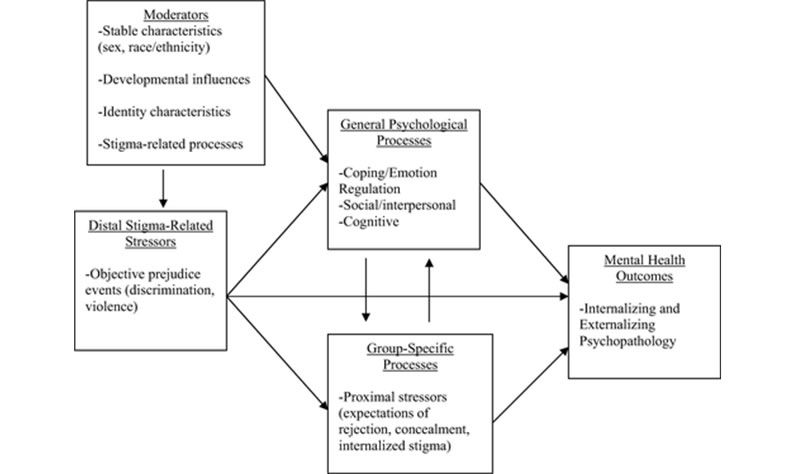
Cultural Model of Suicide Chu, Goldblum, Floyd, Bongar (2010)
- Based on comprehensive inductive analysis of 20 years of culture and suicide literature on risk factors
- Developed to guide cultural competent suicide assessment
- Distilled to 4 categories: cultural sanctions/meanings, idioms of distress, minority stress, social discord
CARS Minority Stress Screener Floyd, Goldblum, Chu, Bongar (in preparation.)
- 12- item scale that includes three subscales: Sexual Minority Stress, Immigrant Stress, and Nonspecific Minority Stress.
- By identifying elevations in any of these subscales (using the T-Score tables provided), clinicians determine the impact that these variables have on their clients’ clinical presentation. By combining information from these scales with general measures of psychological distress and well being, a comprehensive psychosocial assessment of minority clients can address the full range of their clinical need.
CARS Minority Stress Screener Validation of the CMSS comes from previous and current work:
- Previous work:
- Chu, J.P., Floyd, R., Diep, H., Pardo, S., Goldblum, P., & Bongar, B. (2013). A tool for the culturally competent assessment suicide: The Cultural Assessment of Risk for Suicide (CARS) measure. Psychological Assessment.
- Current work
- Internal consistency
- Inter-scale correlations
- Known groups analysis
- Logistic regression
Current Study Methods: Participants
- Included subjects from original study and newly recruited for this study.
- N=1,338 899(76.2%) female, Age range 18-88 (M=24.6, SD=10.2)
- Ethnicity: 47.6% Caucasian, 36.9% Asian, 19.1% Latino/a, 6.5% African American
- Sexual Orientation: 79.% heterosexual, 9.2% homosexual (4.7% lesbian, 4.5% gay men, 7.5% bisexual (6.3% female), 3.4% questioning (2.8% female)
Sample
- Original participants were recruited from universities, colleges, community fliers, social networking sites, online advertisements targeted at recruiting a sample diverse in ethnicity and sexual orientation.
- Participants completed a set of questionnaires either on line or via paper.
- Current sample used additional venues specific to sexual minorities (e.g. Facebook).
Finding 1: Internal Consistency Indices
- All Cronbach’s alpha coefficients were within acceptable range:
- .80 for the full CMSS,
- .73 for the Sexual Minority Stress Subscale,
- .73 for the Immigrant Stress Subscale, and
- .72 for the Nonspecific Minority Stress Subscale.
Finding 2: Inter-scale Correlations
- All 3 subscales were significantly correlated with one another, supporting that they represent different aspects of a unidimensional factor and can be combined into a total score.
Finding 3: Internal Consistency Indices
- Known group analysis helps to establish discriminant and convergent validity by comparing current performance with that expected from previous research, based upon how certain subgroups of people appeared to perform differently and similarly on variables of interest (Stuifbergen et al., 2008).
- The CMSS total and its 3 subscales were responsive to expected group differences, including Known Groups:
- Family Conflict
- Social Support
- Being Punished
- Self Hatred
- Immigrant
- Sexual Minority
- Ethnic Minority
Finding 4: Logistic Regression
- All three subscales were significant, unique predictors of severity of depression symptoms and hopelessness. The CMSS total scale, the Sexual Minority Stress Subscale and the Nonspecific Minority Stress subscale were significantly associated with recent suicide attempts and current suicide ideation.
- Conclusion: This suggests that despite the overlap between the subscales, they are also capturing different aspects of minority stress
Finding 5: Logistic Regression
- When the CMSS total scale was used as a predictor along with ethnicity and sexual identity, sexual orientation remained an unique predictor of suicide attempts, and ethnicity (being Caucasian) remained an unique predictor of severity of hopelessness.
- When the 3 subscales were entered into the model along with ethnicity and sexual identity, ethnicity and sexual identity dropped out as significant predictors of suicide risk behavior, with one exception.
- Caucasian status continued to be an unique predictor of hopelessness even when minority stress is present.
- Conclusion: minority stress subscales tended to be stronger predictors of psychological distress and suicide behavior risk, going beyond identity status, to capture the stress associated with marginalized identities.
Inter-scale Correlations Chart
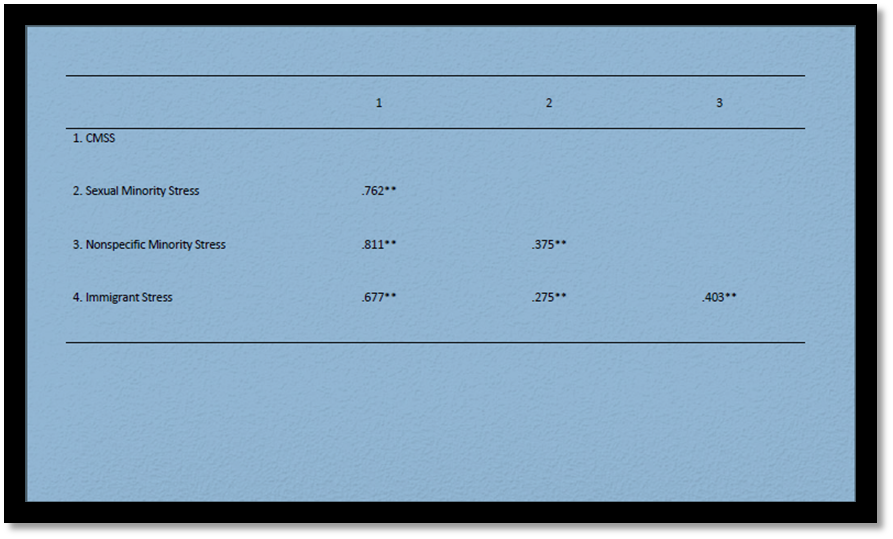
Known Groups Analysis
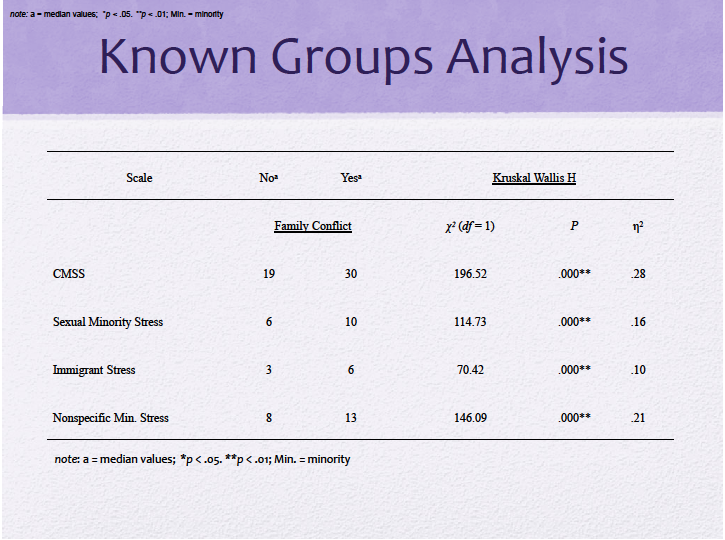
Known Groups Analysis
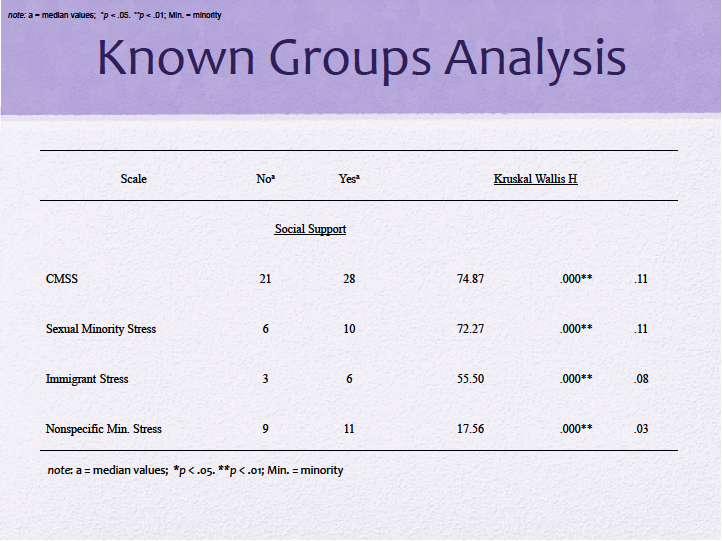
Known Groups Analysis
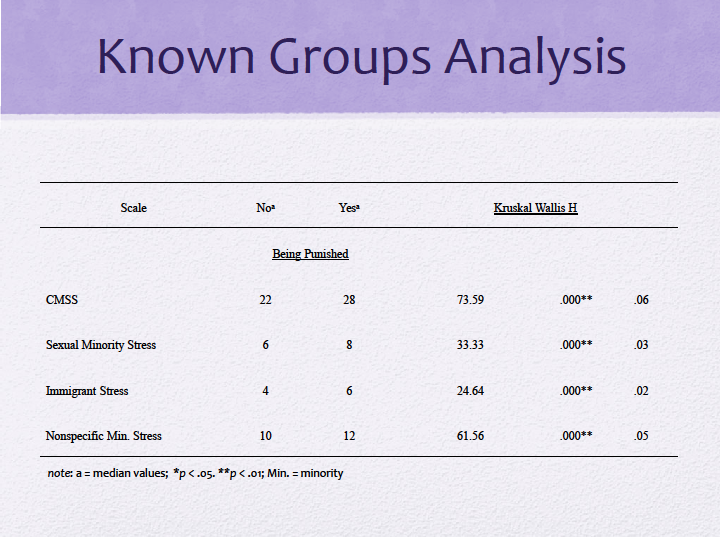
Known Groups Analysis
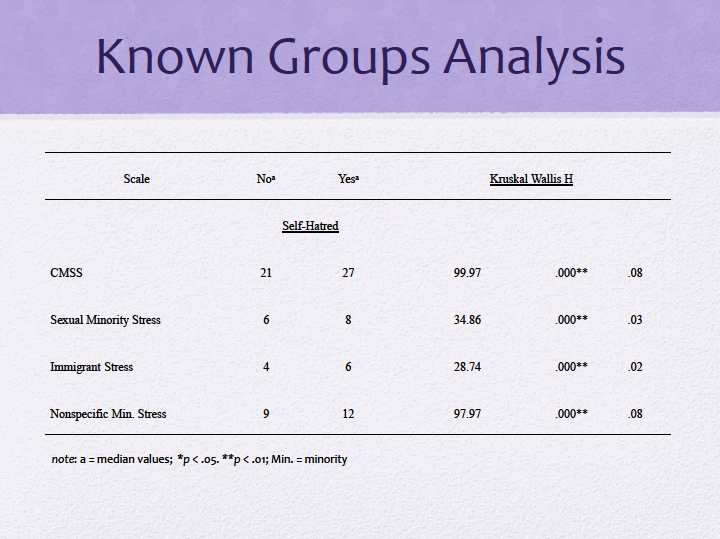
Known Groups Analysis
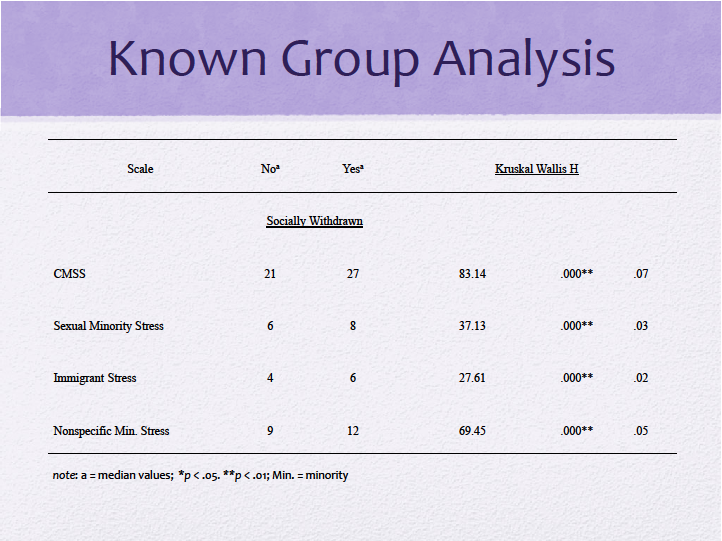
Known Groups Analysis
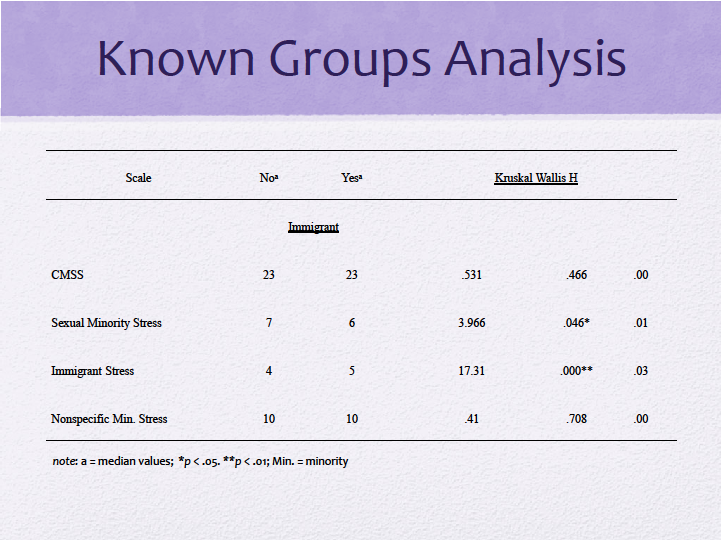
Connect with Innerlife STS on Linked-in by clicking on our logo below.


Innerlife STS is committed to the success of professional clinicians and we invite all professional clinicians to connect with us on Linked-in by clicking on our logo below.



